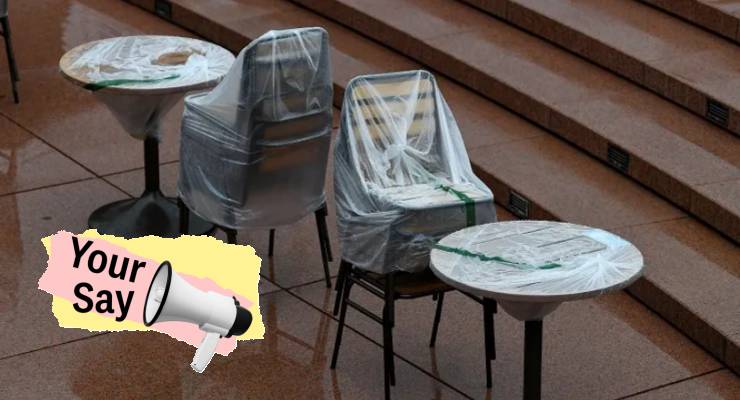
Peter Wilson writes: Re “Scott Morrison is right: Any COVID inquiry that doesn’t look at state issues is meaningless”: the inquiry should look at the role of the oppositions.
The Andrews government made the diabolically stupid decision to use security guards for quarantine hotels, an ideal vector for spreading the virus. The response of the Liberals was to roll out their big gun, Tim Smith, aided by the useful idiots in the Murdoch media to rubbish the inevitable lockdown rather than focus on the incompetent decision.
Meanwhile Dan dined out on the nonsense served up by Smith and the Murdocracy through to the next election (a whitewash) knowing full well he would have the support of the majority of Smith’s elderly constituents in Kew, and anywhere else, who knew they would be dead if Smith’s advice was followed.
Grant Wood writes: What you miss in this is a review of the federal government’s preparedness and responses. The federal government has no accountability and/or responsibility for states’ actions. I doubt it even has the power to investigate state matters that are the constitutional responsibility of each state.
Some issues you refer to arise from the fact that Australia did not have facilities or for that matter a policy in relation to quarantine — a purely federal responsibility under the constitution which was dumped back on to the states.
Death becomes him
Pauline Bleach writes: The story of Rupert Murdoch is the story of dead relatives (“Rupert, even in retirement, takes the low road”). It is the story from The Baltimore Sun of the daughter whose mother died before she could convince her to get the vaccine. The story of how trusting Fox News cost many vulnerable Americans their life. But I expect that story will never be republished in an Australian newspaper. Instead, Australian media will abandon all morals to fawn over his genius and politicians will continue to line up to attend Lachlan Murdoch’s Christmas party. And that is the saddest story of all.
Taking care of business
Sandra Bradley writes: Thank you, Bernard Keane, for highlighting the disdain that some employers — not all — feel for their employees (“Tim Gurner is refreshingly honest — business hates workers and will break the law to hurt them”). No-one asked Tim Gurner to be a property developer so don’t play the tiny violin because your workers have chosen to work in a manner that benefits them and not you. If it’s getting too hard to be a property developer who works in sync with your employees, do us all a favour and get out of the game.
Various sections of the community have been living with this disdain in their workplaces for years, if not lifetimes. I have often told younger people that their labour is valuable and they get to dictate how it is used, not the other way around. When you let employers dictate all the conditions, you are just a slave.
I have been a union member all of my working life because I am not tough enough to get the conditions, benefits and wages that my labour is worth without union support. Unions don’t always come through for their members or in the ways that members might want, but at least with a union you do get a say and they have generated some of the best working conditions in the world for Australian employees.
Chris Holmwood writes: It depends on the business. Many invest in their workers, involve them in decision-making and encourage engagement — and reap the rewards of committed, engaged employees who feel an alliance with the enterprise. However, many businesses don’t, and seek ever-increasing flexibility, which results in a loss of engagement by workers, who just work to rule and feel no loyalty.
Australian workplaces have always been marred by this zero-sum game between business operators and employees, unlike other countries such as Germany, Japan and Korea where there’s a culture of mutual obligation between the two groups.
Peter Riedlinger writes: Right on the money, Guy Rundle (“What Tim Gurner’s headburp tells us about politics today”). Labor bears responsibility for the casualisation of the workforce and associated ills. As someone once observed: Labor is the spare tyre on the capitalist car.
Ghost of Labor past
David Howe writes: Re “Labor’s dithering is dooming the Voice, but there’s still time to change the dirty nappy”: modern Labor is a ghost, animated by some long-forgotten socialist-tending sentiments and philosophy now inhabiting a pseudo middle-class comfort zone. By definition, the current members of federal Parliament are representatives of the wealthy middle class engaged in proxy warfare with the nihilistic reactionary right. They seem obsessed with merely being in power without any real plan to address the failings of the capitalist system or its natural consequence, the looming climate catastrophe.
Labor seems to be suffering from a form of collective amnesia where all the logical arguments about the innate inequity and unsustainability of a consumer-led capitalist economy have been conveniently parked in the archives and supplanted by bandaids in the form of feelgood progressive symbolism. No vision, no plan and certainly no action. Just platitudes.
Nuclear reaction
Geoff Russell writes: John Quiggin (“We don’t need a nuclear renaissance. We need a solid plan on renewables”) thinks France is central to pro-nuclear “faith”. That’s true for many pro-nuclear newbies. But it isn’t true once you take off your renewable blinkers and look around.
Canada is a great example. It not only built plenty of reactors in a short period but designed its own so it wouldn’t need to depend on the US for either making the pressure vessels or for enriched uranium. Its reactors run on natural uranium and can be refuelled while operating.
Then there’s Japan. It built 60 reactors with an average build time of about four years. The Fukushima reactors are famous for melting down after the 2011 tsunami. Less well recognised is that while sea walls all along that coast failed and thousands died, the sea walls around the 14 reactors in three plants along that coast did much better and saved all but a few of the thousands of workers at these sites as well as anybody in their shadow. Had they been built elsewhere, the tsunami toll would have been even higher.
Quiggin may also like to consider the UAE. Building four x 1,400 MW nuclear plants has enabled it to export low-carbon aluminium, rather than close smelters as Germany and Australia have done. But not only that. The UAE now boasts the highest level of women in nuclear anywhere on the planet. It’s hard to underestimate the positive social impact of this project in a Muslim country.
The type of jobs that nuclear creates is, as the UAE has discovered and Canada has always known, one of its great advantages. You don’t just buy PV panels and wind turbines made in China with cheap coal power and connect them up. You need to develop serious skills that can be leveraged in a country for many purposes over decades.








Crikey is committed to hosting lively discussions. Help us keep the conversation useful, interesting and welcoming. We aim to publish comments quickly in the interest of promoting robust conversation, but we’re a small team and we deploy filters to protect against legal risk. Occasionally your comment may be held up while we review, but we’re working as fast as we can to keep the conversation rolling.
The Crikey comment section is members-only content. Please subscribe to leave a comment.
The Crikey comment section is members-only content. Please login to leave a comment.